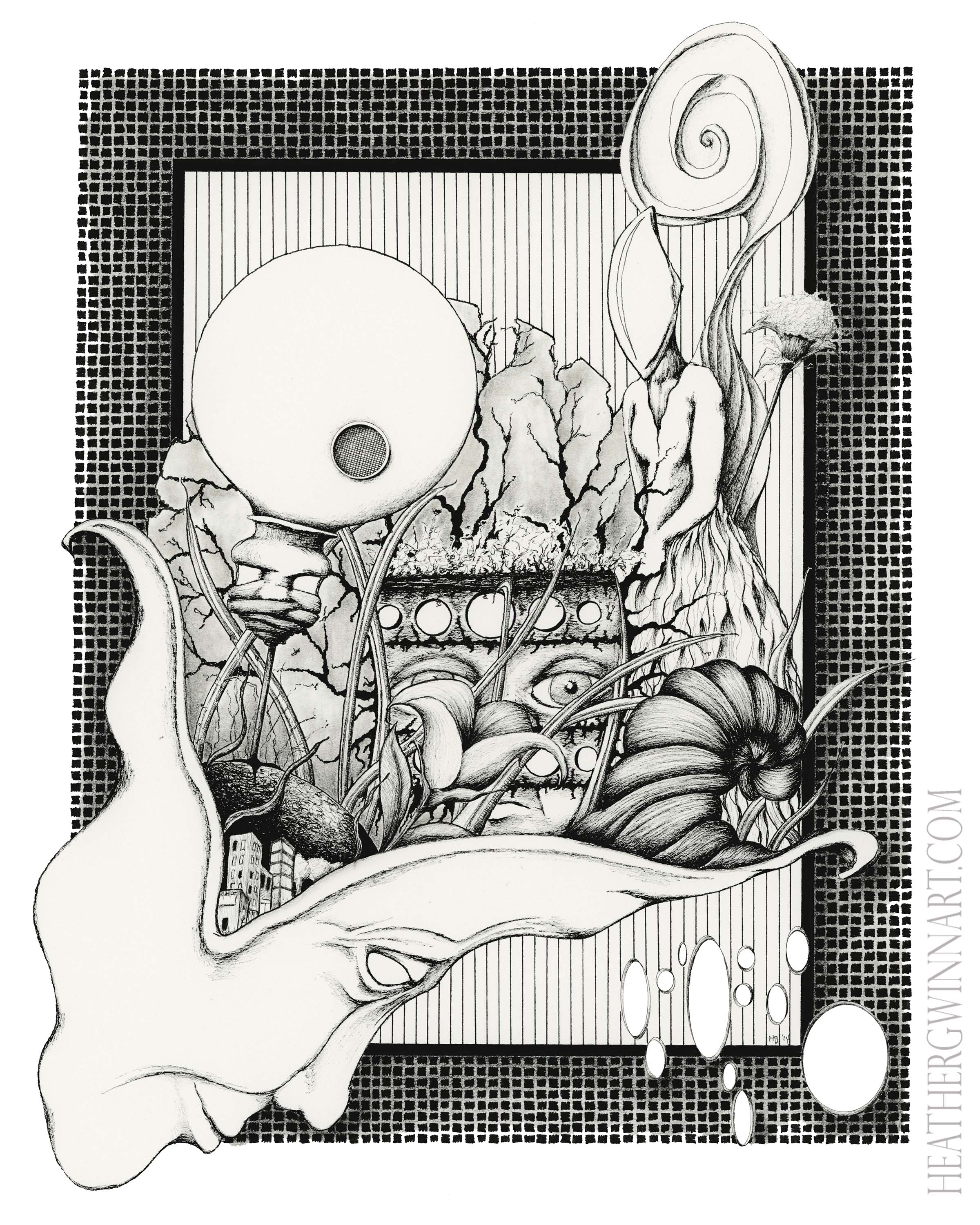The a rtist for issue 10.2 is Heather Gwinn. In a contemporary version of an old story, we stumbled across her work accidentally. One of our editorial assistants, Holli Steinmetz, discovered Heather’s illustrations on Facebook, and tagged me in the comments. I investigated Heather’s website, and found, along with a collection of really beautiful art, an essay about her struggles with her faith.
rtist for issue 10.2 is Heather Gwinn. In a contemporary version of an old story, we stumbled across her work accidentally. One of our editorial assistants, Holli Steinmetz, discovered Heather’s illustrations on Facebook, and tagged me in the comments. I investigated Heather’s website, and found, along with a collection of really beautiful art, an essay about her struggles with her faith.
We approached her with our idea for a coloring book issue, and asked if we could use her art. She agreed, and also contributed a superb artist’s statement.
We live in a world where we are afraid. Where, because of our fear, we seek easier answers. And the really terrifying thing is there are no easy answers. We exist, in part, to feature the work that acknowledges the difficulty, the struggle. And even through the struggle, we find beauty.
Here is Heather’s statement:
I started drawing in 2012. It was a latent passion that rose to the surface in a moment of despondency. My lack of artistic training means that I have learned the rules on the fly, and I still don’t know most of them. Slow and steady, I persevere and follow my joy at drawing. It is a balm for me, an outlet, and a meditation. The moment it becomes work, I’ll have to walk away.
My work is a process more than a product. I don’t plan my work, sketching out elements to determine composition and such. I go at it. Pencil in hand, I might sketch a main figure, or I might just go at the paper and see what happens. I’ve tried plans and I’m no good at sticking to them. A crease or a shadow will reveal something really neat that I just have to explore and then I’m off the map, putting a tentacle on an elbow.
For me, drawing is the fundamental outlet to play and explore. Along the way I stumble across internal conflicts that I can’t quite pin down; issues like identity and faith and weakness. They are whispers and peripheral shadows that vanish when I try to evaluate them. Drawing allows me to sidle up to them, ninja-like, and jot down bits and pieces.
I miss feeling unconditionally loved.
The mourning of my faith has taken a front seat in my work recently. Thematically, I can’t help but come back to postures of prayer, both somber and desperate. Over and over figures of faith appear on my page and I must contend with them. “Reinfirst” was loosely based on Reinfirst Manyuka, who starved to death emulating Jesus’s days in the desert. Manyuka only made it 30 days. There is something both beautiful and tragic and horrifying about the notion. Beautiful, if he felt a sense of peace and oneness with God in his martyrdom, tragic if he were really mentally ill, horrifying if he realized his error and tried to crawl home but was too sick to make it. In many ways, my feelings toward his story encapsulate my feelings about faith.
I converted to Catholicism around 2004 and the following three years were filled with a sense of greater purpose and the warmth of acceptance and peace and place I had never known before. Which was all for the good since my life outside the church was awful.
I miss feeling the warmth of surety and purpose.
Struggling to raise two children and mitigate my husband’s neglect of both them and our marriage, I found comfort in my faith. It was beautiful. After my conversion it became clear that my marriage was like so many others and that our challenges would only serve to strengthen our relationship. I realized that he was just as scared as I was and that we could be stronger together.
Of course, none of that was true. I divorced him in early 2007 and he tried to kill me later that year.
I miss feeling safe in God’s embrace.
That is faith: belief without evidence. It was so easy and rewarding to have faith in my husband and my marriage and my God. It felt wonderful. The feeling was real, but the basis behind it was not. Had I looked at the evidence, I would have found none for my faith in God and even less for my faith in my marriage. Feelings do not make truth.
My faith gave me the tools necessary to ignore what was real, my faith rewarded me for disregarding the truth with false sensations of hope and comfort and purpose. So I don’t have it anymore. I shed it like a bad friend that was so fun and wonderful but fundamentally no good for you.
I miss feeling God is with me.

One Response
Reblogged this on Blog and commented:
So honored!